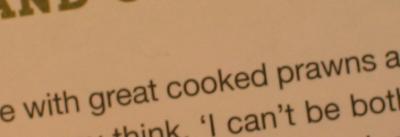Jamie¶
482 words on Food
 Believe it or not – or rather laugh at me – I actually like Jamie Oliver, the
Believe it or not – or rather laugh at me – I actually like Jamie Oliver, the Naked Chef
. I alwas enjoyed watching his show while I lived in the U.K. (The dubbed version in Germany was horrible – broadcast on a station with a teenage audience and thus sounding like a teenage sitcom thingy.) I also picked up a cookbook or three over the years.
While I’m not entirely convinced that all his recipes are great – particularly as far as desserts are concerned – there have been a few nice dishes I got out of those books. And with their nice photos they are a good source of inspiration for the times when you need to cook something without the opportunity to plan in advance.
As far as I can tell, Jamie is by now a huge commercial success, being everything from a television personality to a cook to an ever-do-gooder to a Sainbury’s advertisement guy to a bit fat. But hey, it’s about food after all and with all the relaxed approach to cooking he may actually have had a greater influence on the somewhat problematic food situation in Britain than many of his colleagues.
But one thing in his recipes keeps catching my attention, particularly in the newer books: In many places the ingredients seem to be accompanied by superfluous adjectives and thus read like marketing blurbs. So you apparently need a free-range organic chicken
. Riight?! You’ll probably love to have one of those. But what if it isn’t available at the time or you can’t afford it? Should you not even attempt to cook the recipe in question then – risking that you may have a less-than-ideal taste because of the inferior ingredients? My impression from Jamie’s TV shows was that, yes, ingredients are important, but he’s still the guy who’ll work with whatever is there if needs be.
Isn’t that why cookbooks have introductions? To tell the reader that, yes, it’s probably better to get a free range chicken. And possibly to explain the benefits of using one. I have to admit it’s not even clear to me what the exact difference between an organic, a free-range and a free-range organic chicken is. And even if I’d get that technically right, what’s the difference in texture and taste?
And then the olive oil. Can you even buy oil that’s not labelled extra virgin
? Perhaps you can but then your mum told you not to buy it when you were a kid. Finally I’d like someone to explain (or show) to me what exactly makes a good-quality cooked chickpea
. And how I can tell from looking at the tin. Somehow I expect cookbooks to be pragmatic in these areas. They shouldn’t use big and meaningless words but help me make a decent dish. And if those words are important, they deserve to be explained.




